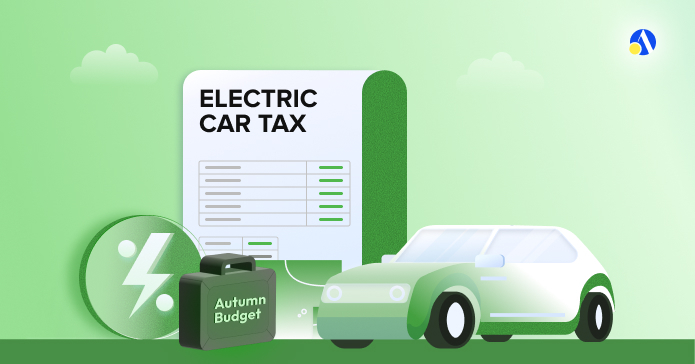Electric Vehicle (EV) owners, are you aware of the looming changes to road tax as part of the upcoming Autumn Budget 2025? For years, EVs enjoyed a welcome exemption, a government push for greener transport, like Ulez. But with the UK's Autumn Budget approaching, this landscape is shifting.
What do these upcoming electric car tax changes mean for your finances and vehicle ownership? This guide offers a clear, concise breakdown of everything you need to know about the future of EV tax, empowering you to navigate these new regulations.
The Current State of Car Tax in the UK
In the UK, Vehicle Excise Duty (VED), commonly known as car tax is determined by a vehicle's CO2 emissions. This system rewards drivers of environmentally friendly cars with reduced tax rates.
- Cars Registered After April 1, 2017:
- Car tax rates are calculated based on CO2 emissions.
- Rates vary significantly, from £0 for the cleanest vehicles to over £2,000 for high-emission models.
- Electric Vehicles (EVs):
- Electric vehicles are currently exempt from paying VED.
- This EV tax exemption has made them a highly attractive option for both individuals and businesses.
- However, this EV tax exemption is scheduled to conclude.
The Upcoming EV Tax Changes: What We Know
To address the impending shortfall in fuel duty revenue as more drivers transition to electric vehicles (EVs), the government is introducing significant new EV tax rules. These upcoming UK car tax changes are designed to remove the current EV tax exemptions, which have made electric cars a highly attractive option.
Why are EV Tax Exemptions Ending?
The government's objective is to secure future tax revenues and establish a fairer system for all drivers. Chancellor Rachel Reeves is expected to confirm these measures in the November 2025 Autumn Budget.
Key proposed changes include:
- Removal of current tax exemptions: This means electric vehicle owners will soon need to pay road tax. (Check how to cancel Road Tax here)
- Introduction of a pay-per-mile tax: This significant proposal is currently under discussion and could apply to electric vehicles from as early as 2028. This aims to directly replace lost fuel duty revenue.
Understanding these upcoming EV tax changes is crucial for both current EV owners and prospective buyers. How will these changes impact your driving costs? Keep an eye on official announcements for precise details.
Will all electric cars pay road tax in 2026?
Yes, electric cars will pay road tax from 2025
The Vehicle Excise Duty (VED) exemption for electric vehicles (EVs) is being removed. This means that since April 2025, all EV owners have been paying VED, also known as road tax, for their vehicle. The specific amount you pay will depend on when your electric car was first registered.
How much is electric car tax?
Electric Car Road Tax: Costs and Breakdown
Understanding the road tax for electric vehicles (EVs) is essential for budgeting. Here’s a detailed breakdown of electric car road tax rates started from 2025:
1. Road Tax for New EVs (Registered on or after 1st April 2025)
- First-year road tax rate: £10 (lowest rate).
- From the second year onwards: Standard rate of £195 per year (current rate).
2. Road Tax for EVs Registered Between 1st April 2017 and 31st March 2025
- These vehicles are charged the standard annual rate of £195
3. Road Tax for Older EVs (Registered Between 1st March 2001 and 31st March 2017)
- These EVs will see a lower road tax rate of £20 per year.
Expensive Car Supplement for EVs Over £40,000
- Starting 1st April 2025, electric cars with a list price exceeding £40,000 have been facing an expensive car supplement.
- This adds an extra charge for the first five years after the vehicle's second licence.
Key Takeaways
- The cost of electric car road tax varies depending on the registration date.
- New EV owners should factor in the expensive car supplement for high-priced models.
- Stay updated on the latest EV tax rates to make informed purchasing decisions.
What are the new car tax changes from November 2025?
The Autumn Budget in November 2025 is expected to formalise key DVLA electric car tax changes. A significant development anticipated is the introduction of a new pay-per-mile system for electric vehicles.
Understanding the Proposed Pay-per-Mile Charge:
- Potential Rate: Current reports suggest a charge of approximately 3 pence per mile.
- Addition to VED: This new charge would be in addition to the standard Vehicle Excise Duty (VED) rates for electric cars, not a replacement.
How will these EV tax changes impact you?
For example, a company car driver covering 20,000 miles annually could see an additional £600 added to their yearly costs due to a 3p per mile charge. This has significant implications for Total Cost of Ownership (TCO) calculations for both businesses and fleet managers.
Navigate the New Tax Landscape with Debitam
The impending electric car tax changes will significantly impact your finances, whether you're a business owner, fleet manager, or individual driver. Understanding these new rules is paramount for sound budgeting and smart vehicle decisions. But how do you ensure you're making the best choice for your future?
Debitam is here to guide you. Recognised as among the best budget accountants and best small business accountants by TrustPilot for navigating complex tax landscapes, we offer precise, practical guidance.
Our experts clarify how new VED rates and potential pay-per-mile charges will directly affect your company's financial health. We empower you to accurately assess your fleet's total cost of ownership, ensure full compliance, and strategically optimise your tax position. Don't let these changes become a burden. Partner with Debitam to confidently navigate the new tax landscape and secure your financial future.














